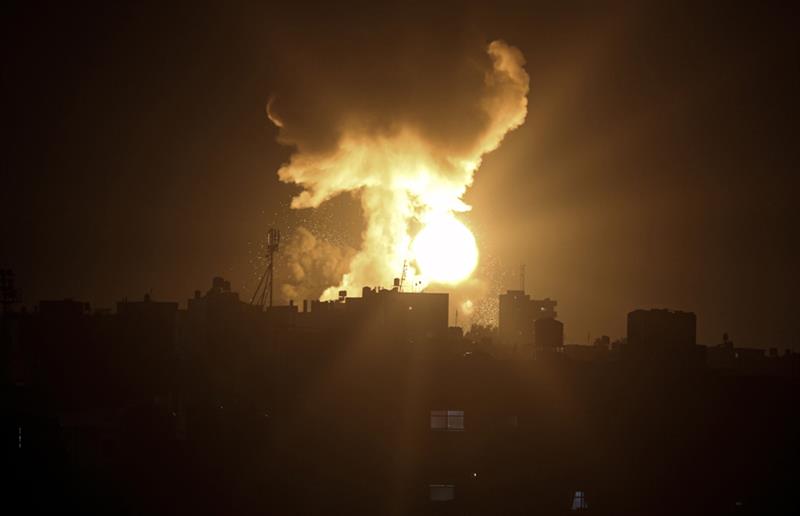
Israel breaches truce in Gaza
Israel’s attack on targets in the Gaza Strip last week threatens to end the fragile peace with the Palestinian factions, writes Mohamed Abu Shaar
Israeli air strikes on Gaza on Sunday shattered a ceasefire that had lasted for several months between Palestinian factions in the Gaza Strip and Israel.
Israel said two rockets had been fired from Gaza towards Tel Aviv and that Israeli strikes had targeted a Hamas location in Khan Younis in the southern Gaza Strip that it claimed housed a rocket factory belonging to Hamas’ armed wing. Other targets included military lookout posts in northwest Gaza.
The Israeli attack came a few hours after the Israeli army announced it had observed two rockets launched from the Gaza Strip towards Tel Aviv that had fallen into the sea. Early warning systems did not activate in Israel before the rockets landed in the water, but Israel said it viewed the incident as crossing a “red line” by armed Palestinian factions in Gaza.
Hamas said the launch of the two rockets had been accidental due to bad weather conditions and sent messages to Israel via mediators saying that lightning had caused the rockets to launch and denying that they were part of ongoing rocket testing.
Hamas sometimes launches test rockets into the Mediterranean Sea as part of its development of its military capabilities.
However, Israel’s political and military leadership was not convinced by Hamas’ explanation. Facing popular and media pressure at home, it decided to respond by bombing Hamas targets in the Gaza Strip.
Tel Aviv’s response was “measured,” according to some observers, and Israel wanted to lay down the rules of engagement with the armed Palestinian factions in Gaza and at the same time not trigger an all-out confrontation. This was especially after Egypt had put pressure on both sides to exercise self-restraint and prevent a broader confrontation.
Israeli Prime Minister Naftali Bennett said of the incident that “all the tales by Hamas about thunder and lightning that happen every winter do not fool us. Anyone who aims a rocket towards Israel must pay the price.”
Israeli Defence Minister Benny Gantz and Armed Forces Chief of Staff Rav-Aluf Aviv Kochavi said the same thing after meeting with military commanders to decide how to respond to the Gaza rockets.
Israel’s state-owned KAN news agency quoted an official as saying that “this is a serious incident and is unacceptable.” He added that despite claims that the Islamic Jihad group could have been behind the rocket launches, Hamas controlled the Gaza Strip and “was responsible” for them.
Despite signals that neither side wants further escalation, Israeli analysts believe that Hamas is turning up the heat to pressure Israel to make compromises on lifting the siege on the Gaza Strip.
Hamas is under pressure from its promises to Palestinians in Gaza after the last war with Israel in May 2021 to the effect that this military confrontation would be the prelude to an end to the economic troubles and successive crises in the Gaza Strip.
This was explicitly stated by leader of Hamas Yahya Al-Sinwar, but obstacles have emerged in Israeli preconditions on lifting the Gaza siege, linking it to a prisoner-exchange deal between Israel and Hamas. Hamas rejects this link and wants the two issues to remain separate.
Egypt is making herculean efforts to de-escalate tensions between the two sides and avoid confrontations on the ground, especially since Cairo has plans to assist in the reconstruction of Gaza.
This will require calm and stability to ensure that Egypt can help to ease the humanitarian crisis in Gaza and rebuild what was destroyed during the war in May.
Other than the two rockets fired from Gaza, there are other elements that could push military confrontation to the fore. Islamic Jihad and its military wing have threatened that there will be a military response if Hesham Abu Hawwash, a Palestinian prisoner held by Israel who has been on hunger strike for 140 days, dies.
Hawwash’s health is deteriorating quickly, according to medical reports by Palestinian agencies that focus on detainees in Israeli prisoners.
“Hesham Abu Hawwash is being subjected to premeditated murder by the occupation forces, who are arrogantly determined to deliver a loss to the Palestinian people,” said Qadura Fares, president of the Palestinian Prisoners Association.
Abdel-Qader Al-Khateeb, undersecretary of the Commission for Detainees and Former Detainees Affairs, said that “Hawwash is approaching the end by the minute and is on the brink of death. Doctors are talking about the probability of sudden death or blood clots that will have permanent consequences.”
The Palestinian government has said it will hold Israel responsible if there are repercussions if Hawwash dies, especially after other threats by Palestinian detainees held in Israeli prisons. Tensions are already high after a Palestinian detainee stabbed an Israeli guard at the Israeli Nafha Prison.
Ziyad Al-Nakhala, secretary-general of Islamic Jihad, said that “if Hesham Abu Hawwash dies, we will view this as a premeditated assassination by the enemy and will respond as we would to any other assassination.”
This is being seen as a clear reference to a military response if Hawwash dies, which would drag Gaza into further confrontation.
Khaled Al-Batsh, a member of Islamic Jihad’s politburo, confirmed that Al-Nakhala’s position is shared between the leadership of Hamas and Islamic Jihad, as well as their military wings.
Although Islamic Jihad is leading the threats against Israel if Abu Hawwash dies, Hamas will be forced to participate in any future fighting, especially since Abu Hawwash’s cause is supported by the majority of Palestinians.
While Israel and the Palestinian factions want to uphold the truce, at least for now, any sudden developments on the ground could end the fragile calm in Gaza.
But Palestinians hope that Egypt’s ongoing efforts will prevent any extensive military confrontation, especially since they are still suffering from the consequences of the confrontation six months ago.
No comments:
Post a Comment